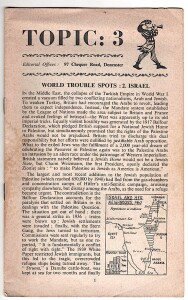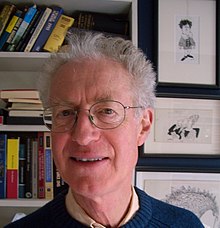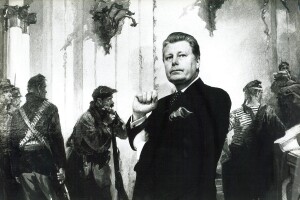
Discovered in a July 1991 copy of Boardroom Magazine, a glossy brochure covering ‘News, Views & a Taste of the Good Life ‘ is a large feature on the celebrity art dealer Roy Miles, then at the height of his fame ( or notoriety ).
Interleaved with the profile of Miles by one Alison Becket are a number of promotional items, including an invitation to attend Mr Miles’s ‘ Russian Summer Show ‘ at his gallery in Bruton Street, Mayfair, a mocked up page from the Mail on Sunday of October 1990 advertising a show by the Russian expressionist painter Sergei Chepik and other reproduced pages from the Daily Telegraph and the Sunday Times promoting Chepik and highlighting the fact that such famous people as Mrs Thatcher ( who was given a painting by Chepik) and Eddy Shah ( remember him?) had come to see works by the ‘ Russian genius’.
On the front cover of the magazine we are shown a photograph by Lord Snowdon no less of Mr Miles resplendent in dark suit, spotted tie and slicked back hair staring straight at the camera. Above this image we find the description that firmly nailed the dealer in the eyes of a certain type of wealthy art collector as ‘the Man Who Introduced Russian Paintings to the West ‘. By ‘ Russian Paintings ‘ of course, we are not talking about Malevich, Tatlin and the Suprematists. They would not have appealed at all to the former Prime Minister whose favourite poem was ‘Elegy in a Country Churchyard’, and probably not to Mr Miles’s other clientele. No, the Russian paintings that Miles brought over to the UK were firstly Soviet Social Realism and then as a total contrast, the subversive and sometimes nightmarish depictions of torture and oppression that Chepik began painting as an exile in Paris from 1988 as his protest towards the Soviet regime.
Born in 1935 to a prosperous , art-loving middle-class family in Liverpool, he appreciated art and indeed won a prize for a watercolour aged ten. At the same time he was making money by selling Dinky Toys to his fellow schoolboys. He had arrived in London by the late fifties and for a short time worked for an antique dealer. Continue reading

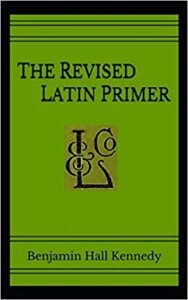
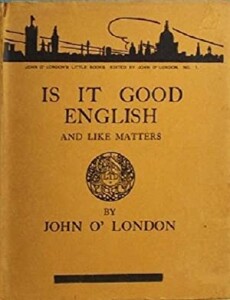
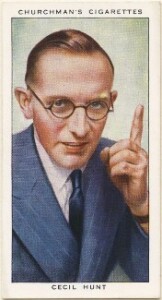

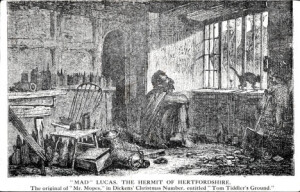


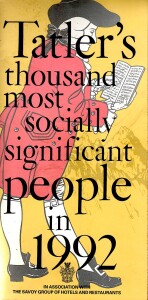 and perhaps still newsworthy, according to Tatler’s Thousand Most Socially Significant People in 1992.
and perhaps still newsworthy, according to Tatler’s Thousand Most Socially Significant People in 1992.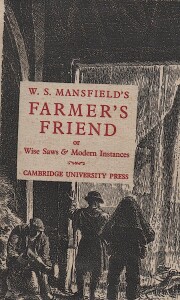
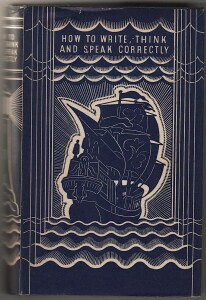
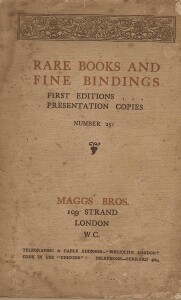
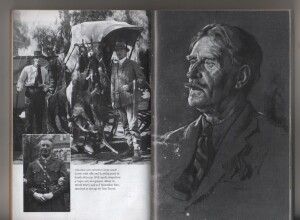
 Cecil Hunt ( 1902 – 54) was a journalist, editor, novelist and anthologist best known throughout the English-speaking world for his compendiums of schoolboy ‘ howlers’. His first collection appeared in 1928 and proved to be a best-seller. At various times afterwards he produced other anthologies of howlers as well as guides to journalism, which he had studied at King’s College, London, and creative writing, books on the origins of words and a collection of unintentionally funny letters. He also wrote novels under two pseudonyms ( Robert Payne and John Devon). Interestingly, Hunt was President of the London Writers’ Circle and was instrumental in establishing Swanwick Writers’ Summer School. He died at just 51, but ironically his wife lived to be 107.
Cecil Hunt ( 1902 – 54) was a journalist, editor, novelist and anthologist best known throughout the English-speaking world for his compendiums of schoolboy ‘ howlers’. His first collection appeared in 1928 and proved to be a best-seller. At various times afterwards he produced other anthologies of howlers as well as guides to journalism, which he had studied at King’s College, London, and creative writing, books on the origins of words and a collection of unintentionally funny letters. He also wrote novels under two pseudonyms ( Robert Payne and John Devon). Interestingly, Hunt was President of the London Writers’ Circle and was instrumental in establishing Swanwick Writers’ Summer School. He died at just 51, but ironically his wife lived to be 107.
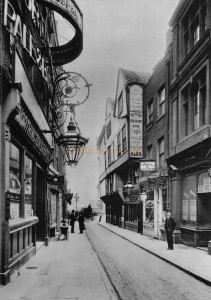 We have seen ( previous Jot) how, in his first book, Bohemia in London, the young Arthur Ransome was happy to confess his bibliophilia. He seemed to love second hand books more than brand new ones, but he hated the practice of selling unwanted books ( whether new or second hand, he doesn’t say) given as gifts ending up on bookseller’s shelves. Certain people feel no guilt about doing this; they assume, wrongly, that they will never be found out, but if the gift is inscribed there is a reasonable chance that the bibliophile who gifted the book will discover it in some bookshop or bookstall eventually.
We have seen ( previous Jot) how, in his first book, Bohemia in London, the young Arthur Ransome was happy to confess his bibliophilia. He seemed to love second hand books more than brand new ones, but he hated the practice of selling unwanted books ( whether new or second hand, he doesn’t say) given as gifts ending up on bookseller’s shelves. Certain people feel no guilt about doing this; they assume, wrongly, that they will never be found out, but if the gift is inscribed there is a reasonable chance that the bibliophile who gifted the book will discover it in some bookshop or bookstall eventually.
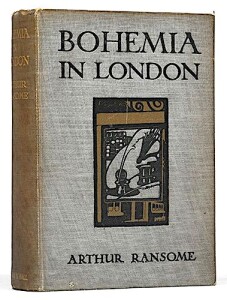 in collectable condition fetching £500 or more.
in collectable condition fetching £500 or more.